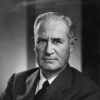Arthur Hays Sulzberger

Arthur Hays Sulzberger
Arthur Hays Sulzbergerwas the publisher of The New York Times from 1935 to 1961. During that time, daily circulation rose from 465,000 to 713,000 and Sunday circulation from 745,000 to 1.4 million; the staff more than doubled, reaching 5,200; advertising linage grew from 19 million to 62 million column inches per year; and gross income increased almost sevenfold, reaching 117 million dollars...
NationalityAmerican
ProfessionPublisher
Date of Birth12 September 1891
CountryUnited States of America
Along with responsible newspapers we must have responsible readers.
I am a non Zionist because the Jew, in seeking a homeland of his own, seems to me to be giving up something of infinitely greater value of the world. ... I look askance at any movement which assists in making the peacemaker among nations merely a national warrior.
What Ottawa and Washington used to think about Turkey or Iran was not very important because we really didn't think much about either, but now what we think about them is extremely important - to ourselves and to many other peoples.
We [journalists] tell the public which way the cat is jumping. The public will take care of the cat.
Freedom cannot be trifled with. You cannot surrender it for security unless in a state of war, and then you must guard carefully the methods of so doing.
Any coalition has its troubles, as every married man knows.
I believe in an open mind, but not so open that your brains fall out.
Obviously, a man's judgement cannot be better than the information on which he has based it. Give him the truth and he may still go wrong when he has the chance to be right, but give him no news or present him only with distorted and incomplete data, with ignorant, sloppy or biased reporting, with propaganda and deliberate falsehoods, and you destroy his whole reasoning processes, and make him something less than a man.
For eleven months and maybe about twenty days each year, we concentrate upon the shortcomings of others, but for a few days at the turn of the New Year we look at our own. It is a good habit.
Freedom of the press, or, to be more precise, the benefit of freedom of the press, belongs to everyone – to the citizen as well as the publisher… The crux is not the publisher’s ‘freedom to print’; it is, rather, the citizen’s ‘right to know.’
News is so often a report of conflict, an account of problems, a thing of the day and even of the minute, that sometimes I think we make the background darker and the shadows deeper than they actually are.
The statesmen still say that we should not interfere in the internal affairs of other nations and yet it is not possible any longer not to interfere, even when we do not mean to do so.
All nations are more tolerant of their own mistakes and weaknesses than of the mistakes and weaknesses of others.
Speakers are not supposed to waste time on platitudes, but the capacity of this generation for ignoring the obvious and concentrating on the negative and the obscure is immense.